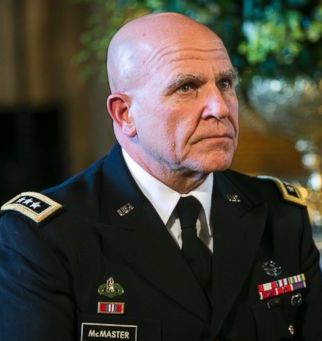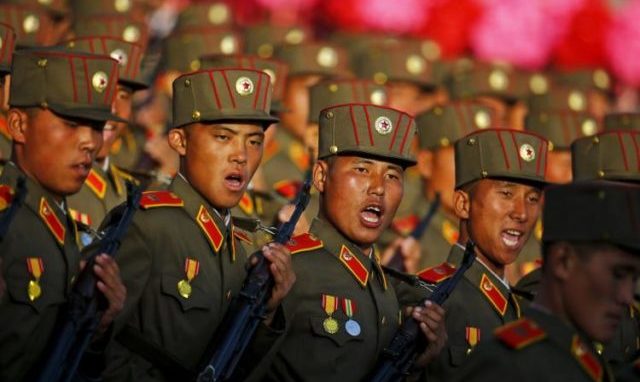VIDEO: How President Trump can deal with the North Korean threat

President Trump’s National Security Adviser Lt. Gen. H.R. McMaster.
Trump National Security Adviser, U.S. Army Lt. Gen. H.R. McMaster, had an interview with ABC’s Martha Raddatz on the network’s “This Week” program on Easter Sunday, April 16, 2017. The issue de jour was what to do about bellicose hermit state North Korea . On the 105th anniversary of the birth of the founder of the dynastic Communist regime , grandfather Kim Il Sung, a massive military parade was held in Pyongyang , Saturday April 15th. There with televised images of huge goose stepping marching formations and displays of both mobile Musdan intermediate range and submarine launched missiles. As if on cue, North Korea attempted another missile launch following the celebratory parade that blew up on the launching pad, prompting a muted response from the White House.
This followed demonstrations of force with a US Navy Tomahawk missile strike on an airbase in Syria, allegedly the site from which gas attacks were launched against civilians and opposition in Idlib province. That was followed this week by the dropping of a MOAB, so-called massive ordnance air burst bomb, from a USAF C-130 in Afghanistan. It allegedly aimed destroyed caves and tunnels used by ISIS, with conflicting reports as to casualties ranging from 36 to upwards of 100 casualties.
The parade in the vast Pyongyang square was held before hereditary leader Kim Jong-un and what passes for the North Korean Comintern leadership. McMaster speaking from Kabul, Afghanistan said in response to Raddatz’s question about the Trump Administration would do against this threat overarching that of ISIS and Syria in the Middle East:
While it’s unclear and we do not want to telegraph in any way how we’ll respond to certain incidents, it’s clear that the president is determined not to allow this kind of capability to threaten the United States.
I think there’s an international consensus now, including the Chinese and the Chinese leadership, that this is a situation that just can’t continue. And the president has made clear that he will not accept the United States and its allies and partners in the region being under threat from this hostile regime with nuclear weapons. He said the National Security Council is working with the Pentagon and the State Department, and intelligence agencies working on providing options “and have them ready” for President Donald Trump “if this pattern of destabilizing behavior continues.”
McMaster said it is the consensus of the US, along with allies in the region,that “this problem is coming to a head. And so it’s time for us to undertake all actions we can, short of a military options, to try to resolve this peacefully.”
Watch the ABC This Week Martha Raddatz Interview with National Security Adviser Lt. Gen. McMaster:
Trump tweeted Thursday that he had “great confidence” in China’s ability to “properly deal with North Korea.” He indicated openness to possible US intervention if China can’t convince North Korea to stand down in its nuclear and missile program saying, “If they are unable to do so, the U.S. with its allies, will!!”
Perhaps he was referring to the USS Vinson carrier battle group that was dispatched to the peninsula bristling with missiles, squadrons of carrier based attack aircraft and possibly nuclear warhead missiles submarines.
Trump dispatched Vice President Pence to South Korea to confer with our ally on the front line of any threat, conventional or non-conventional , that Pyongyang might unleash if the US undertook a preemptive attack.
Japan’s Premier Abe was concerned about the ability of North Korea to launch a missile with a Sarin gas warhead. That was eerily reminiscent of the domestic Japanese terrorism attacks of the 1990’s by an apocalyptic cult Aum Shinrikyo, whose chemical laboratory produced the deadly nerve agent that killed over two dozen and in a subway attack exposed thousands to its effects. Doubtless, Abe was prompted by the recent assassination of Kim’s half brother in Kuala Lumpur by two women who administered the deadly nerve agent VX.
Abe and tens of millions of Home Island Japanese are also concerned about possible delivery of a nuclear warhead equipped existing North Korean Missile with a range of 800 miles like the Nodong 1. Equally concerned are the 20 million residents of Seoul South Korean and tens of thousands of U.S. forces on the DMZ. Then there are US Air and Naval assets in Japan, Okinawa and the American Territory of Guam within the 2,000 mile range of those Musudan mobile missiles on display in Pyongyang.
We chanced to watch the PBS Charlie Rose Show on April 14th when he interviewed former acting CIA director Mike Morell about the North Korean threat conundrum. When queried by Rose about what might Trump ask China President, Xi-Jinping Morrell, said negotiate with China to intervene with North Korea’s Kin Jong-un about the consequences of not standing down.
Gordon Chang said it best in an April 4, 2017 Daily Beast article about what Trump might discuss with Xi-Jinping just prior to the Mar a-Lago meeting with President Trump. China should stop selling North Korea those mobile erector TEL launchers for the Musudan and future KN-08 and KN-14 intercontinental ballistic missiles, plans for the Chinese Jl-1 submarine missile, uranium hexafluoride, pumps and other components for its nuclear program. We would also include the sale of Chinese alumna power and technology used to mix solid propellant for those missiles.
The reality is that none of this is going to persuade Kim Jong-un, a man who doesn’t stint for murdering his own family, relatives and senior Comintern members and senior officers of North Korea’s military. Trillions of dollars of bribes wouldn’t suffice. Sanctions haven’t worked. What it suggests is some means of removing Kim and perhaps key Comintern leaders from that dias overlooking the massive parade in Pyongyang on April 15th.
In all seriousness, the China syndrome is not something we want to trigger. Rather it is using the China opening to prevent that from happening along with whatever nuclear missile threat that North Korea has under looming development. The other suggestion was accelerating more effective anti-ballistic missile defense in the critical boost rather than mid-course or terminal phases. We may know shortly if North Korea has mastered the re-entry shield for deployment of possible multiple targeted warheads.
Trump has very limited options and time available to do something to stop North Korea before the 2018 midterm election if not the before 2020. He doubtless will request that National Security Adviser H.R. McMaster, Pentagon chief Mattis and others on the NSC Principals Committee vet some plausible military and diplomatic options to deny the hermit kingdom from a preemptive attack on our allies and US military assets in the region. Perhaps they might follow Chang’s suggestions about what to negotiate with China to forestall North Korea achieving nuclear ICBM hegemony.
RELATED ARTICLE: Pence: ‘Era of strategic patience’ on North Korea is over
EDITORS NOTE: This column originally appeared in the New English Review.

